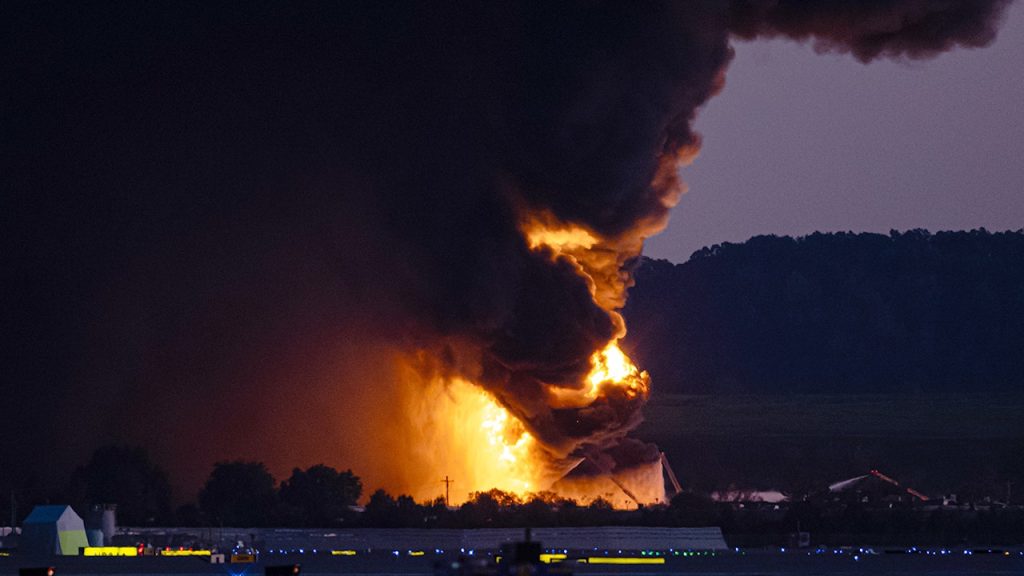UPS Cargo Plane Crash in Louisville: Engine Failure Leads to Tragic Aftermath
In a devastating incident that rocked Louisville, Kentucky on Tuesday evening, a UPS cargo plane crashed shortly after takeoff, claiming the lives of at least 11 people, including all three crew members and a young child. The National Transportation Safety Board (NTSB) confirmed Wednesday that the left engine of UPS Flight 2976 detached from the aircraft during takeoff from Muhammad Ali International Airport around 5:15 PM ET. The plane, carrying more than 200,000 pounds of fuel, crashed into the Kentucky Petroleum Recycling building, resulting in a fiery explosion that also injured 11 people on the ground. Kentucky Governor Andy Beshear declared a state of emergency the following morning to assist with recovery efforts, solemnly noting that the death toll was expected to rise to 12 by Wednesday night and asking citizens to “continue to pray for their families and loved ones during this heartbreaking time.”
The investigation into the crash is gaining momentum as NTSB officials recovered the aircraft’s “black box” – containing both the cockpit voice recorder and flight data recorder – on Wednesday afternoon. Though exposed to intense heat from the post-crash fire, the critical recording devices appeared intact and were quickly transported to the NTSB’s specialized laboratory in Washington, D.C. for analysis. Preliminary information indicates the flight had no delays prior to departure, and no immediate maintenance work was performed before takeoff. Significantly, investigators noted there were no known airworthiness directives associated with either the aircraft or its engines, despite the plane having been in service for nearly 35 years according to Federal Aviation Administration records. The NTSB confirmed the FBI is assisting with the investigation “under a longstanding Interagency agreement,” though it remains unclear whether criminal intent is suspected or what specific cargo the plane was carrying.
The NTSB has established several specialized groups to conduct a thorough investigation into every aspect of the crash. These include an operations group reviewing the flight history and crew duties leading up to the incident; a structures group documenting the wreckage, impact angles, and aircraft trajectory; a power plants group examining the engines and related components; a systems group investigating hydraulics, electrical systems, instruments, and flight controls; and a maintenance group reviewing the aircraft’s maintenance records and history. Officials emphasized they are carefully balancing the need for a meticulous investigation with the urgency of reopening runways at the Louisville airport, which serves as a critical node in the national supply chain network.
The crash site at Louisville Muhammad Ali International Airport holds particular significance as the home of UPS Worldport, the shipping company’s global air cargo hub and its largest package-handling facility worldwide. UPS is deeply embedded in Louisville’s economic fabric as the city’s largest employer, providing jobs to approximately 26,000 people. The daily shipments that flow through this hub contain what NTSB officials described as “life-saving drugs, postal products, food, supplements, you name it,” underscoring the far-reaching impact of disruptions to this vital logistics center. The incident has sent ripples of concern throughout the shipping and aviation industries, as investigators work to determine whether the engine failure represents an isolated mechanical issue or potentially indicates a broader safety concern.
As part of standard investigative procedures, the NTSB is holding an organizational meeting to establish formal roles for various stakeholders, including the aircraft manufacturer, operator, labor unions representing crew members, and relevant government agencies. Once these entities join the investigation as official parties, they become prohibited from commenting publicly on the incident without NTSB consent, ensuring that information released about the crash remains accurate and controlled. This methodical approach to accident investigation reflects the NTSB’s commitment to determining not just what happened, but why it happened, and how similar tragedies might be prevented in the future. Officials also noted that despite the ongoing federal government shutdown affecting many agencies, the NTSB’s investigation will continue without disruption.
The Louisville crash joins a troubling series of recent aviation incidents, including a Hong Kong cargo plane accident that killed two people and a collision between United Airlines jets at San Francisco International Airport. These events come at a time when the FAA has been directing airlines to reevaluate their emergency evacuation procedures, particularly regarding passenger carry-on items. As the Louisville community grieves for those lost and begins the process of recovery, the aviation industry watches closely for the findings that will emerge from this investigation. The detachment of an engine during takeoff—a rare and catastrophic failure mode—will likely prompt renewed scrutiny of maintenance protocols and aging aircraft monitoring, particularly for the workhorse cargo planes that form the backbone of global logistics networks but often receive less public attention than their passenger-carrying counterparts.


